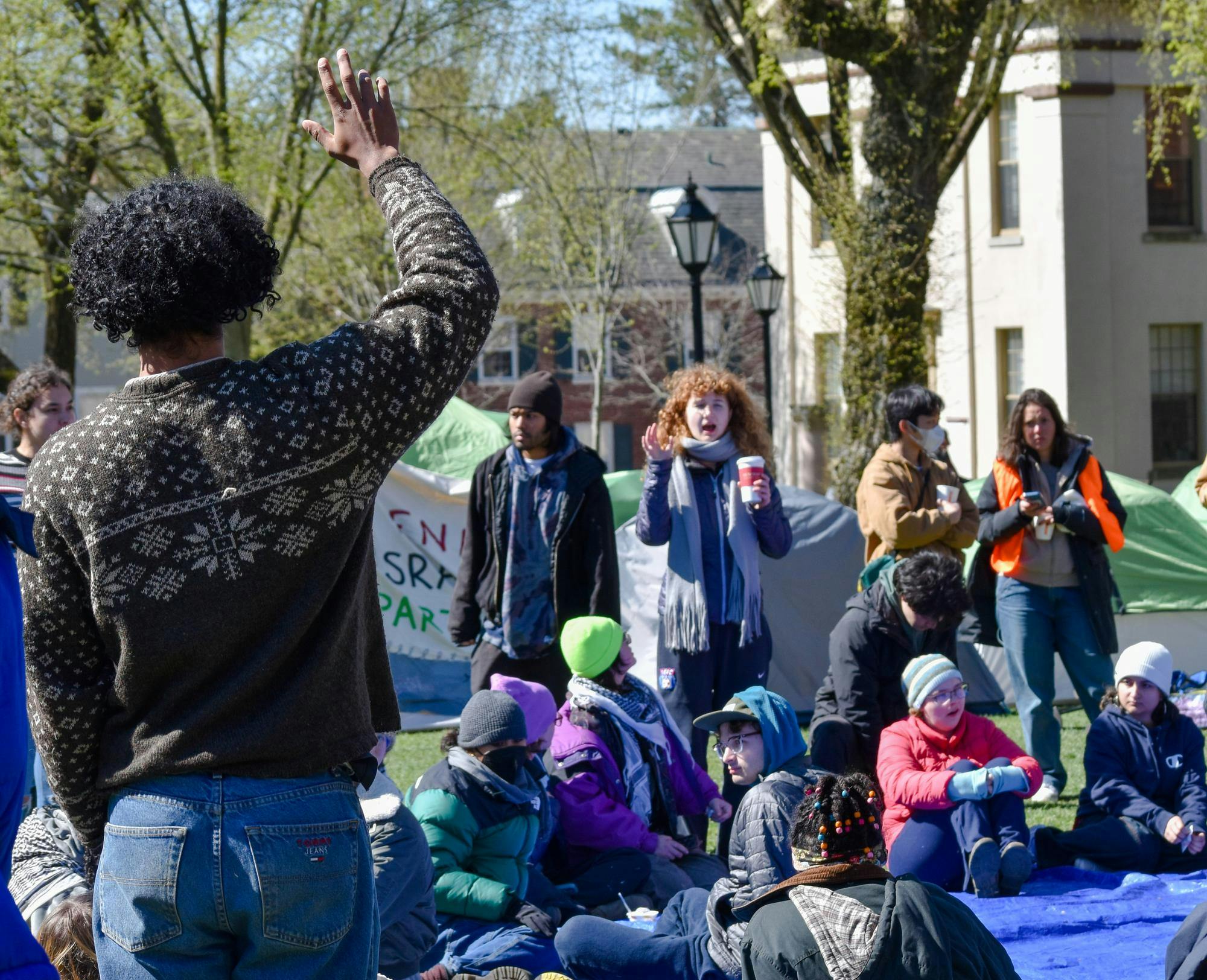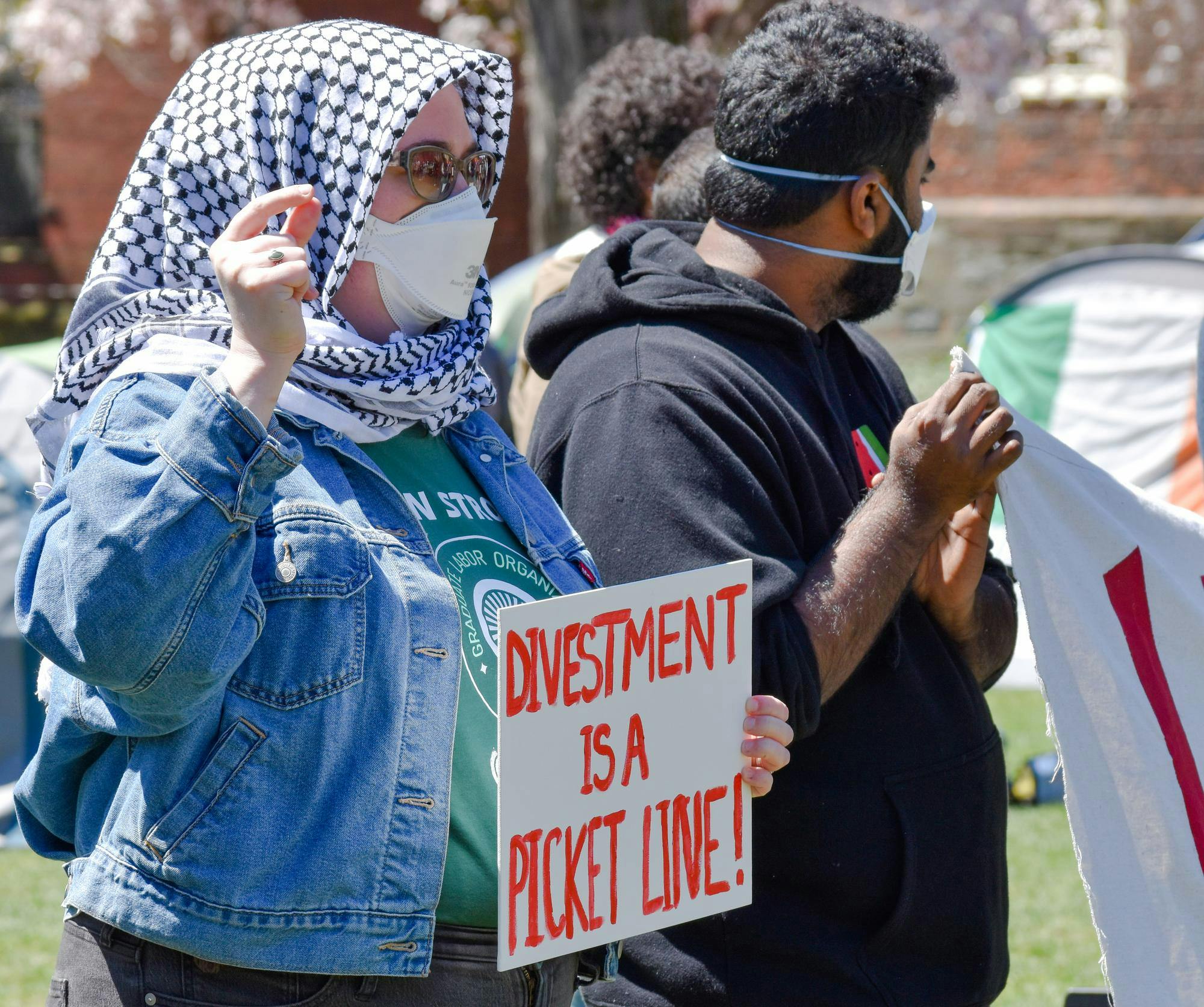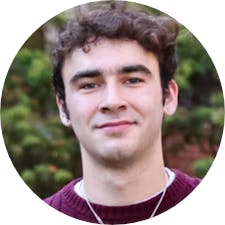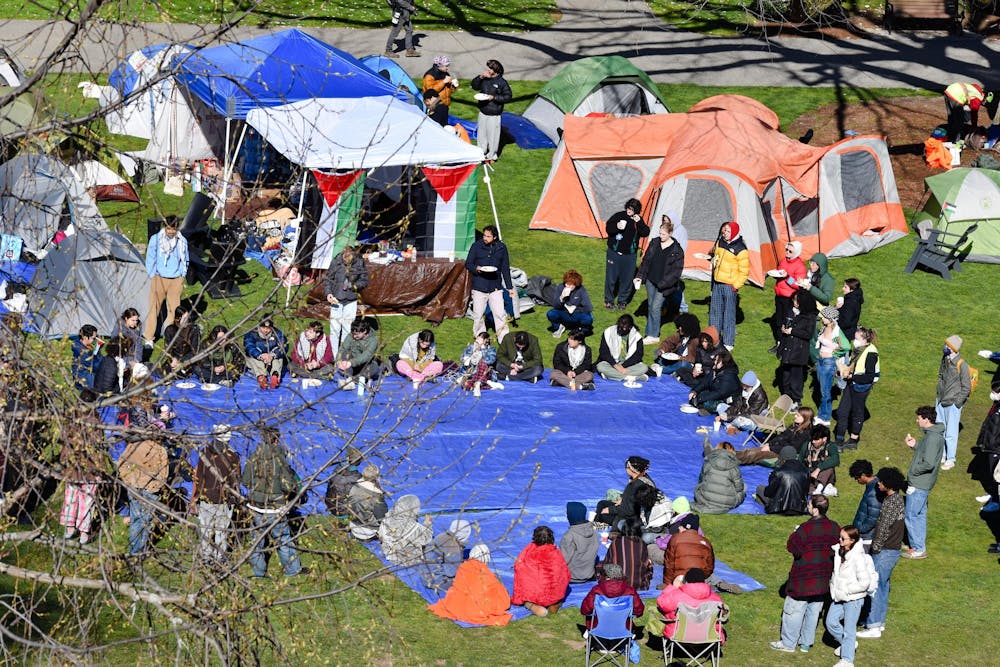The number of students participating in the encampment, which is now on its second day, has risen to over 100. As of 9 a.m., there were about 45 tents on the Main Green.
The demonstrators are calling on the University to divest from companies linked to the Israeli government and drop charges against the 41 students arrested in a Dec. 11 sit-in.

At 9 a.m. on Thursday, demonstrators convened on blue tarps in the center of the green to discuss future plans for the encampment. Arman Deendar ’25, a spokesperson for BDC, said that from its inception, organizers “wanted open discussions where people could voice their opinions and concerns about the action.”
“There’s so much diversity of opinion and people are figuring it out as they go,” they added. “What we do now is up to the community as it forms.”
Initially, students had expected that “the University would most likely clear the encampment within the first 72 hours” based on events at other institutions, according to encampment spokesperson Sam Stewart ’24.
But following recent communications from President Christina Paxson P’19 P’MD’20, protesters said they are now expecting the demonstration to last longer. All 105 participants are planning to stay on the Green until their demands are met or until law enforcement removes them, Stewart said.
At 10:30 a.m., the Department of Public Safety began scanning student IDs, the fourth time since the encampment started Wednesday morning.
Clark previously wrote in an email to The Herald that “the University continues to ask individuals in or in immediate proximity to the encampment to present their Brown IDs for two reasons: to verify association with Brown for safety and security reasons, and to appropriately address potential violations of policy.”
Clark also noted that the Office of Student Conduct and Community Standards has notified approximately 130 students of potential conduct violations for encampment-related activities, all of whom had their cards swiped on Wednesday. Students whose ID information was collected on Thursday have yet to be notified of the status of their cases.
At noon, the Brown Palestine Solidarity Caucus and the Graduate Labor Organization held a “picket line for Palestine,” with around 200 protesters in attendance.

According to a joint Instagram post, both organizations claim that “Brown has unilaterally implemented repressive new protest policies and has announced it will impose these rules on unionized workers without bargaining with us first.”
Clark wrote in an email to The Herald that the University was not required to consult with GLO before changing protest policies.
At 4 p.m., the Brown University Community Council hosted a meeting to vote on two motions concerning student calls for divestment. Both motions passed, meaning that BUCC will recommend to Paxson that the University drop charges against 41 students arrested in a Dec. 11 sit-in, and that five student representatives “conducting activism for divestment” be allowed to present their case for divestment to the Corporation, The Herald previously reported.
Additional reporting by Dana Richie
Editor’s note: Below is a summary of previous coverage by The Herald detailing context regarding the encampment and related demonstrations
The encampment follows a series of similar demonstrations at other universities, most notably at Columbia which began a “Gaza Solidarity Encampment” on April 17. New York Police Department Officers arrested over 100 students at Columbia last Thursday and 120 at New York University on Monday. On Wednesday, police arrested at least 50 people at the University of Texas at Austin and more than 90 protesters at the University of Southern California.
At Brown, the protests have remained peaceful, with DPS officers only present to record student ID information. The Office of Student Conduct and Community Standards notified the “approximately 80 students” identified on Wednesday morning that the office was reviewing potential student conduct violations, according to University Spokesperson Brian Clark.
“Discipline for any student found responsible will depend on behavior of the participants and other factors, including prior conduct code violations,” he added. “While we cannot speculate about specific conduct findings, outcomes may include probation or separation from the University.”
In a Tuesday email, Provost Francis Doyle sent an email to the university community that an “encampment itself is not an arrestable offense, it is a violation of University policy” and may lead to disciplinary action “up to and including separation from the institution.”
The protesters demand that the University adhere to a 2020 report compiled by the Advisory Committee on Corporation Responsibility in Investment Practices that recommends “divestment from companies that facilitate the Israeli occupation of Palestinian territory.”
In a recent Q&A published by the University, Vice President and Chief Investment Office Jane Dietze said that “given today’s realities, it’s not possible to divest the way Brown did in South Africa or Sudan.”
Dietze referred to increased reliance on external managers, which oversee 96% of Brown’s endowment, as barriers to divestment. Of the 4% of the endowment the University directly invests, none are affiliated for “any of the companies discussed in the current divestment debates,” she said.
Brown’s encampment marks a continued call for divestment from companies affiliated with Israel this academic year. On Nov. 8, police arrested 20 students affiliated with Brown Jews for Ceasefire Now following a University Hall sit-in; another 41 students with Brown Divest Coalition were arrested during a Dec. 11 sit-in and placed on University probation. The 41 students from the December sit-in continue to face criminal proceedings.
In February, a group of protesters partook in an eight-day hunger strike demanding that the Corporation “hears and considers a divestment resolution.” Paxson refused to meet their demands, instead encouraging them to submit a divestment proposal to the Advisory Committee on University Resource Management — ACCRIP’s successor.
In response, the strikers argued that the ACURM proposal consideration process would take too long, saying that it could “take months — an untenable timeline given the urgency of the crisis in Gaza.”
In an interview with The Herald, Paxson said that she would “ask ACURM to fast track” divestment consideration, should a proposal be submitted.

Owen Dahlkamp is the managing editor of newsroom on The Herald's 135th Editorial Board, overseeing the paper's news operations. Hailing from San Diego, CA, he is concentrating in Political Science and Cognitive Neuroscience with an interest in data analytics. In his free time, you can find him making spreadsheets at Coffee Exchange.

Ryan Doherty is the managing editor of digital content and vice president of The Herald's 135th editorial board. He is a junior from Carmel, NY who is concentrating in chemistry and economics. He previously served as a university news and science & research editor, covering faculty and higher education.

Avani Ghosh is a Metro editor covering city and state politics. She is a junior from Ohio studying Health and Human Biology and International and Public Affairs. She is an avid earl grey enthusiast and can be found making tea in her free time.





